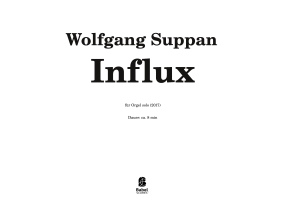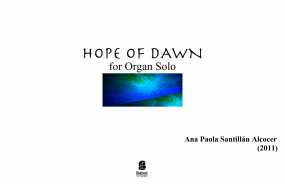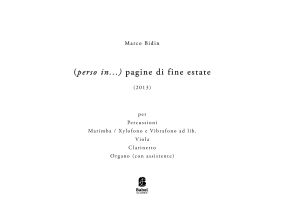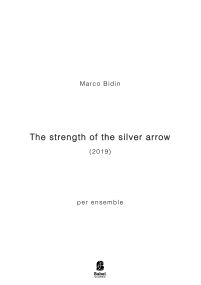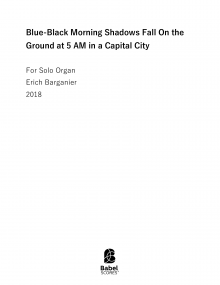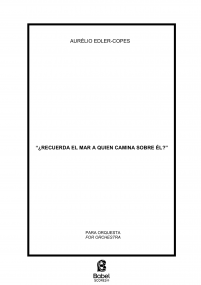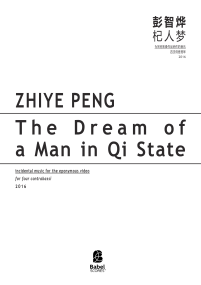Apposte Messe
#35 (1996)
8,76 €
Versión digital (+0,00 €) para descarga
Versión impresa (+14,80 € impresión y envío). Colissimo7-14 days aprox.
Al comprar una partitura, usted puede contactar al compositor aquí mismo!
Especificaciones
Region
Europe
Estimated Duration
6 - 10min
Date
1996
ISMN : 979-0-2325-0811-5
In Stock
Descripción
A one-manual tracker organ, owned by professor Max Yount of Beloit College, became an unsuspected source of transient airflow characteristics sent through a not-fully opened valving system. The instrument, designed to capitalize upon the historical mean-tone tunings utilized in the music of the Renaissance, features a wide variety of acoustic outputs with the pallets partially opened. The resultant sounds included: wolf cries, electronics like buzzes, tones higher and lower than the fully depressed fundamental frequency and inharmonic air states.
Simultaneously, the cacce "Apposte Messe" by Lorenzo da Firenze lept out of the bookcase and, striking my noggin squarely in the middle, suggested in a loud voice that the amorous hunt without dogs and riders form the template from which to compare unfamiliar strangers with friends. In other words....
The cacce by Firenze is not intended as a reference to an older stylistic genre, but to serve as a constant from which to compare the transient characteristics. Much like the scientific method, in which a certain property is standardized, against which the experimental measures may be compared in order to develop quantifiable and repeatable results, the procedure of Apposte Messe conceptually assumes that the cacce has a known objective property or quality against which an other may be compared. That the cacce will serve in the capacity of an objective/known quality is risky in the scientific realm as quantification of a myriad of parameters (ie. subjectivity of subject, experimenter, performer or performance medium, and the development of meaningful measures, to name just a few) is doubtful. BUT for the purposes of artistic expression, the cacce presents a well-defined stylistic genre as template, which is only partially realized as nearly every tone becomes a carrier of transient airflow.
(Mike Edgerton)
Add to list
- Login to create your own lists
A one-manual tracker organ, owned by professor Max Yount of Beloit College, became an unsuspected source of transient airflow characteristics sent through a not-fully opened valving system. The instrument, designed to capitalize upon the historical mean-tone tunings utilized in the music of the Renaissance, features a wide variety of acoustic outputs with the pallets partially opened. The resultant sounds included: wolf cries, electronics like buzzes, tones higher and lower than the fully depressed fundamental frequency and inharmonic air states.
Simultaneously, the cacce "Apposte Messe" by Lorenzo da Firenze lept out of the bookcase and, striking my noggin squarely in the middle, suggested in a loud voice that the amorous hunt without dogs and riders form the template from which to compare unfamiliar strangers with friends. In other words....
The cacce by Firenze is not intended as a reference to an older stylistic genre, but to serve as a constant from which to compare the transient characteristics. Much like the scientific method, in which a certain property is standardized, against which the experimental measures may be compared in order to develop quantifiable and repeatable results, the procedure of Apposte Messe conceptually assumes that the cacce has a known objective property or quality against which an other may be compared. That the cacce will serve in the capacity of an objective/known quality is risky in the scientific realm as quantification of a myriad of parameters (ie. subjectivity of subject, experimenter, performer or performance medium, and the development of meaningful measures, to name just a few) is doubtful. BUT for the purposes of artistic expression, the cacce presents a well-defined stylistic genre as template, which is only partially realized as nearly every tone becomes a carrier of transient airflow.
(Mike Edgerton)
Instrumentation
Pipe organ
Recording
recording from a concert performance by Professor Gary Verkade at Carthage College in Kenosha
Score Details
Format - A4 / US Letter
Pages - 44
Pages - 44
Customers Who Viewed This Piece Also Viewed:





![conTemp[s]lations image](/images/stories/virtuemart/product/resized/index.php_285x285.png)
